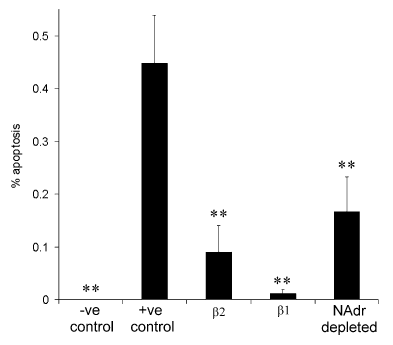Studies in vitro have shown that signalling through the myocyte β1-adrenergic receptor (AR) pathway induces, whereas β2-AR signalling inhibits, apoptosis (Zaugg et al. 2000). Consensus is now growing for the use of β2-AR selective agonists for inotropic support in heart failure. Here, we show that the net effect of β2-AR stimulation in vivo may in fact induce apoptosis.
Male Wistar rats (Rattus norvegicus) (280 ± 18 g) were administered (S.C.) 5 mg of clenbuterol kg-1 (positive control and experimental groups) or the saline vehicle only (negative controls). The receptor pathways mediating the myocardial apoptosis were investigated by prior administration (S.C.) of selective β1-AR (10 mg of bisoprolol kg-1) or β2-AR (10 mg ICI 118,551 kg-1) antagonists 1 h before the clenbuterol. To investigate clenbuterol’s role as a neuromodulator, the sympathetic nervous system was depleted of noradrenaline (NAdr) by administering (S.C.) 2 mg reserpine kg-1 24 h prior to the clenbuterol. Four hours after clenbuterol or saline administration, rats were killed in accordance with the UK Animal (Scientific Procedures) Act, 1986, and the hearts rapidly excised and snap frozen. An antibody directed against caspase 3 (R & D Systems) was used to detect the incidence of apoptosis on 5 mm cryosections of the hearts. Apoptosis in the subendocardial region of each heart was quantified in six random fields using image analysis and the results (Fig. 1) are expressed as per cent area.
No damage was found in the hearts from the negative control group. In contrast, in the hearts exposed to clenbuterol, a significant level of apoptosis was found. As expected, prior β2-AR blockade significantly prevented the apoptosis induced by the β2-AR selective agonist. Unexpectedly, however, β1-AR blockade also significantly prevented the clenbuterol-induced apoptosis, as did the prior administration of reserpine. Through a process of elimination, we propose that the β2-AR stimulation of the sympathetic varicosities by clenbuterol induced an enhanced release of NAdr, and it is this NAdr which, acting through the myocardial β1-ARs, induced the apoptosis.
These data support previous in vivo and in vitro studies showing that apoptosis in the heart is mediated through the β1-AR pathway. However, our study in vivo contradicts previous work in vitro, which has suggested that β2-AR agonists may be used as inotropic support for heart failure patients. In conclusion, these data suggest that the net response to β2-AR stimulation in vivo is to induce apoptosis.
This work was supported by the BHF.
All procedures accord with current UK legislation.

